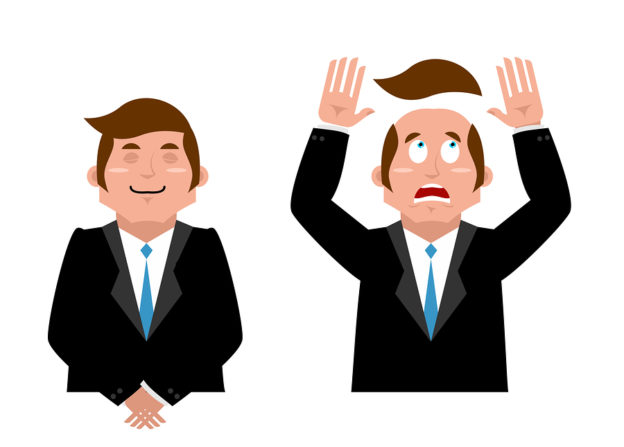By David Blyweiss, M.D., Advanced Natural Wellness
June 15, 2016
• It’s not testosterone that causes men to go bald
• Hair loss and prostate problems go hand-in-hand
• What’s good for your prostate is good for your hair
One of the most frustrating aspects of male aging is hair loss. And this is a problem that doesn’t wait for old age. In fact, about two-thirds of men between the ages of 30 and 50 are already experiencing male pattern hair loss. Some are even younger.
Now, when men come into my office with this condition, there are several common misconceptions.
Some have heard that that clogged hair follicles are to blame. Others have heard just the opposite, that regular shampooing causes their hair to fall out. (If either of these were true, you could grow new hair just by washing your hair more or less often!)
But the largest majority of them are on the right path. They understand that testosterone is somehow involved in hair loss. They’re just missing a few crucial pieces of information.
You see, it’s not testosterone itself that’s responsible for male balding. Rather, it’s a byproduct of testosterone called dihydrotestosterone, or DHT.
DHT binds to receptors in your hair follicles and causes them to shrink. This puts them into a permanent state of rest that makes it difficult for new hair to grow and survive. (Since women also produce some testosterone, they’re susceptible to this process too.)
So you might think “Hey! If I lower my testosterone levels, then my DHT levels will fall and my hair will grow back.”
Not so fast…
Hair Loss and Prostate Problems go Hand-in-Hand
Here’s something you may not be aware of.
Male pattern baldness often goes hand-in-hand with prostate enlargement. This is a condition known as benign prostatic hyperplasia, or BPH.
Like hair loss, BPH is linked to higher levels of DHT.
But lowering testosterone levels won’t necessarily reduce the amount of DHT you produce. That’s because a particular enzyme – 5-alpha reductase – is required to convert testosterone to DHT.
Popular hair loss and BPH drugs are designed to inhibit this enzyme. These include drugs like Proscar and Propecia. The active ingredient in these drugs is finasteride.
The World's Quickest Solution for Ending Prostate and Urinary Misery
This has recently been revealed to be one of the only real breakthroughs in prostate health.
The seeds of a strange fruit (sometimes called "Chinese Apples") hold powerful phytonutrients that are a revolution in prostate health.
In fact, UCLA and Veterans Administration research have now proved this to be true.
Not only that, but it may be the worlds quickest solution for ending prostate misery.
Simply stated, these phytonutrients represent a huge step beyond beta sitosterol, saw palmetto, and other phytosterols alone.
Simply click HERE if you want to have fast prostate relief...restful, uninterrupted sleep...no more constant "urges to go"...enhanced virility...and optimal prostate support for life.
Unfortunately, they also come with a potentially deadly side effect; an increased risk of developing high-grade prostate cancer.
Additionally, they can cause erectile dysfunction, dampen your libido and result in ejaculation problems. These conditions can continue, even after you’ve stopped taking the drug.
However, there is a safe way to protect against hair loss and support your prostate without dangerous pharmaceuticals.
What’s good for Your Prostate is good for Your Hair
Men with prostate problems often use an extract from the saw palmetto to relieve their symptoms. The berries from this tropical plant contain a compound called beta sitosterol, which naturally blocks 5-alpha reductase.
Both saw palmetto and beta sitosterol provide results similar to finasteride when it comes to improve BPH symptoms and urine flow. And they don’t come with any of the libido-busting side effects.
Better yet, what’s good for your prostate is good for your hair.
It turns out that the naturally occurring 5-alpha reductase inhibitors in saw palmetto and beta sitosterol also improves hair loss in about 60% of the people who take it.
If you take saw palmetto, aim for about 320 mg twice daily. A beta-sitosterol extract will be more concentrated. So if you go that route, you’ll want to take between 50 to 130 mg once a day.
Taking either one with a black pepper extract called bioperine (5 mg) makes it easier for your body to absorb the beta-sitosterol and reap its full benefits.
SOURCES:
FDA Drug Safety Communication: 5-alpha reductase inhibitors (5-ARIs) may increase the risk of a more serious form of prostate cancer. U.S. Food and Drug Administration. Jun 2011.
Geavlete P, et al. Serenoa repens extract in the treatment of benign prostatic hyperplasia. Ther Adv Urol. 2011 Aug; 3(4): 193–198.
Carraro JC, et al. Comparison of phytotherapy (Permixon) with finasteride in the treatment of benign prostate hyperplasia: a randomized international study of 1,098 patients. Prostate. 1996 Oct;29(4):231-40; discussion 241-2.
Prager N, et al. A randomized, double-blind, placebo-controlled trial to determine the effectiveness of botanically derived inhibitors of 5-alpha-reductase in the treatment of androgenetic alopecia. J Altern Complement Med. 2002 Apr;8(2):143-52.







